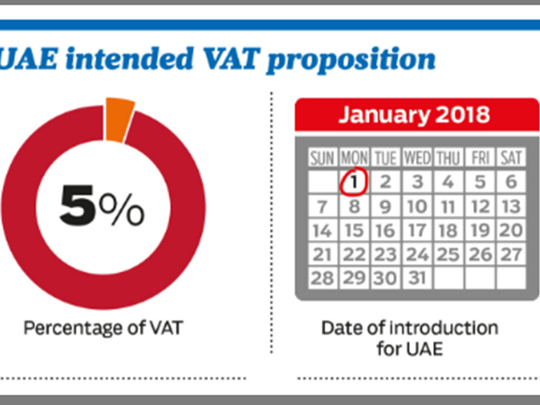
Dubai: The UAE’s Ministry of Finance has announced the start of its countrywide awareness campaign to educate various stakeholders on the collection of value-added tax (VAT).
To help businesses prepare, the ministry plans to hold several briefings for entrepreneurs — from small and medium-sized enterprises (SMEs) to huge multinational organisations during the next couple of months.
Tax experts have warned that VAT comes at a cost and exposure to penalty if not administered correctly. Companies and traders who are consistently in a position of recovering VAT from the government will need to factor in the potential negative cash flow impacts that their business will be exposed to as well as the likely additional scrutiny their books and records will be subject to by the tax authorities.
“Ascertaining the scope of the changes required within your business at an early stage is essential to the successful implementation of VAT. Once the scale of the task is known, it will be necessary to develop a structured and comprehensive implementation plan. You should consider establishing a steering group comprising of the senior management group within your organisation to oversee this process and to ensure appropriate reporting and coordination,” said Jeanine Daou, PwC Middle East Indirect tax leader
With the deadline fast approaching companies need to be aware of the long lead times required for effecting VAT compliance within the organisation. In addition to the changes required to IT systems and processes while ensuring relationships
with customers, suppliers, intermediaries and any other impacted external parties are compliant or able to be made compliant immediately upon the introduction of VAT.
For example, long-term leases, customer and supplier agreements and other contractual obligations currently in effect or under negotiation may span the VAT effective date, and therefore need to be reviewed in light of each parties’ VAT obligations and entitlements.
While it is important to allocate adequate resources to effect changes in the organisations, one of the areas that will require special focus is the changes required in the information technology systems (IT).
“An assessment of the capabilities of existing IT systems and re-configurations necessary in order to generate VAT compliant outputs is crucial. In many cases, significant changes will be required to IT platforms and present workflows and processes,” said Daou.
Accounting systems
ERP systems will need to be enhanced and modified to incorporate all aspects of VAT implementation. From the point of sale terminals, invoice and accounting systems, information technology systems and management reporting systems, VAT will have an impact on the entire of business systems.
Meanwhile a number of accounting firms, law firms and ERP solutions providers have been organising seminars on requirements for VAT compliance.
In a recent document An introduction to value added tax in GCC, PwC lists a checklist for VAT preparations for companies.
• VAT mapping of business processes and transactions to identify which systems and how they are impacted.
• Ensuring underlying Enterprise Resource Planning (ERP) changes are made to reflect all relevant VAT processes.
• Determine the need and beneficial use of VAT specific tools (transaction integrity checking, cash flow monitoring, automated VAT filing/reporting).
• Appropriate governance and controls to ensure VAT regulations and commercial drivers change systems are kept up to date.









